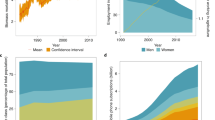Abstract
This synopsis provides an outlook for the complex issue of tropical forestry and rural development. It is based on the previous chapters, and incorporates historical facts, rural development politics and policies, and management systems and instruments. The mix between factual and instrumental aspects rules out a simple conceptual framework. In this synopsis the co-evolution model presented at the outset is taken up, to represent the complex reality of tropical forestry and rural development (Fig. 13.1). The highly dynamic and action-oriented character of this outlook is rooted in the discussion of paradigm changes, leading to design elements for a prospective tropical forestry and rural development theory.
Access this chapter
Tax calculation will be finalised at checkout
Purchases are for personal use only
Similar content being viewed by others
References
Agrawal A (1995) Dismantling the divide between indigenous and scientific knowledge. Dev Change 26:413–439
Ashley C, Maxwell S (2001) Rethinking rural development. Dev Policy Rev 19(4):395–425
Berkes F (2012) Sacred ecology, 3rd ed. Routledge, New York/London
Berkes F, Colding J, Folke C (eds) (1998) Linking social and ecological systems. Management practices and social mechanisms for building resilience. Cambridge University Press, Cambridge
Blaikie P (1985) The political economy of soil erosion in develo** countries. Longman, London
Carpenter SR (2002) Ecological futures: building an ecology of the long now. Ecology 83(8):2069–2083
Choussudovsky M (1997) The globalisation of poverty: impacts of IMF and World Bank reforms. Third World Network, Penang
Ellis F (1998) Household strategies and rural livelihood diversification. J Dev Stud 35:1–38
Ellis F, Biggs S (2001) Evolving themes in rural development 150s–2000s. Dev Policy Rev 19(4):437–448
Escobar A (1988) Power and visibility: development and the intervention and management of the Third World. Cultur Anthropol 3(4):428–443
Eucken W (1990) Grundsätze der Wirtschaftspolitik, 6th edn. J. C. B. Mohr (Paul Siebeck), Tübingen
Fals-Borda O, Mora-Osejo LE (2003) Context and diffusion of knowledge. A critique of Eurocentrism. Action Res 1(1):29–37
Ferguson N (2012) Civilization. The six killer apps of western power. Penguin Books, London
Gelder BV, O’Keefe P (1995) The new forester. Intermediate Technology, London
Habermas J (1988) Theorie des kommunikativen Handelns, 1 & 2nd edn. Suhrkamp, Frankfurt
Hurni H, Messerli B (1981) Mountain research for conservation and development in Simen, Ethiopia. Mt Res Dev 1(1):49–54
McCarthy J, Prudham S (2003) Neoliberal nature and the nature of neoliberalism. Geoforum. http://dx.doi.org/10.1016/J.geoforum.2003.07.003
Monserud RA (2003) Evaluating forest models in a sustainable forest management context. Forest Biometry Model Inf Sci 1:35–47
Norgaard RB (1994) Development betrayed the end of progress and a coevolutionary revisioning of the future. Routledge, London/New York
North DC (1990) Institutions, institutional change and economic performance. Cambridge University Press, Cambridge
North DC (1991) Institutions. J Econ Perspect 5(1):97–112
Ostrom E (1990) Governing the commons: the evolution of institutions for collective action. Cambridge University Press, New York
Peet R, Watts M (1996) Liberation ecologies: environment, development, social movements. Routledge, London/New York
Peluso N (1992) Rich forests, poor people. Resource control and resistance in Java. University of California Press, Berkley/Los Angeles/London
Pretzsch (2003) Methodological aspects of tropical forest management research. In: Contribution to the XII World Forestry Congress, Quebec City. http://www.fao.org/DOCREP/Article/WFC/XII/0791-C4.HTM. Last Access 5 Jan 2013
Rinawati F, Stein K, Lindner A (2013) Climate change impacts on biodiversity – the setting of a lingering global crisis. Diversity 5:11–123
Roe E (1994) Narrative policy analysis. Theory and practice. Duke University Press, Durham/London
Scheffer M, Carpenter S, Foley JA, Folke C, Walker B (2001) Catastrophic shifts in ecosystems. Nature 413:591–596
UNEP (2011) Green Economy Report. Towards a green economy: pathways to sustainable development and poverty eradiction. http://www.unep.org/greeneconomy/GreenEconomyReport. Pree release 2011, last access October 2013
Uphoff N (1993) Grassroots organizations and NGOs in rural development: opportunities with diminishing states and expanding markets. World Dev 21(4):607–622
Warren DM, Slikkerveer LJ, Brokensha D (1995) The cultural dimension of development. Indigenous knowledge systems. Intermediate Technology Publications, London
Author information
Authors and Affiliations
Corresponding author
Editor information
Editors and Affiliations
Rights and permissions
Copyright information
© 2014 Springer-Verlag Berlin Heidelberg
About this chapter
Cite this chapter
Pretzsch, J., Darr, D., Lindner, A., Uibrig, H., Auch, E. (2014). Prospects for Forest-Based Rural Development. In: Pretzsch, J., Darr, D., Uibrig, H., Auch, E. (eds) Forests and Rural Development. Tropical Forestry, vol 9. Springer, Berlin, Heidelberg. https://doi.org/10.1007/978-3-642-41404-6_13
Download citation
DOI: https://doi.org/10.1007/978-3-642-41404-6_13
Published:
Publisher Name: Springer, Berlin, Heidelberg
Print ISBN: 978-3-642-41403-9
Online ISBN: 978-3-642-41404-6
eBook Packages: Biomedical and Life SciencesBiomedical and Life Sciences (R0)




